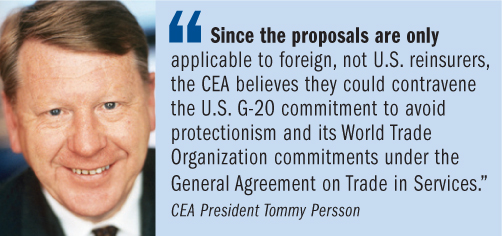Disallowing the tax deduction for reinsurance between affiliated entities would have a "detrimental effect on U.S. consumers" and lead to higher insurance premiums, the head of a trade group representing European carriers warned.
In a letter to members of Congress, Tommy Persson, president of the CEA–a European insurance and reinsurance federation–made the comments in response to proposals in Washington designed to restrict the ceding of premiums to offshore affiliates.
One proposal by the Obama administration is projected by the Joint Tax Committee to raise $2.3 billion in additional revenues over 10 years. Another proposal, by Rep. Richard Neal, D-Mass., is projected to raise $17 billion over 10 years.
 "The CEA believes that substantial unintended and negative consequences would result from the implementation of such proposals," warned Mr. Persson.
"The CEA believes that substantial unintended and negative consequences would result from the implementation of such proposals," warned Mr. Persson.
Mr. Persson said the legislation would lead to higher costs placed on foreign and foreign-controlled insurers and reinsurers doing business in the United States.
"EU reinsurers face an average tax burden of 25 percent, so the argument that the existing tax deduction could create incentives to reinsure more than would otherwise occur between unrelated entities does not hold true," Mr. Persson wrote in his letter. "The proposals would also lead to taxation in both the U.S. and the reinsurer's country of origin, thereby violating U.S. double tax treaties."
Furthermore, he said U.S. law already includes adequate tools to deal with "income-shifting" from U.S. insurance subsidiaries to foreign affiliate reinsurers. The transfer pricing rules of the U.S. Internal Revenue Code mean that no further measures are required to prevent tax evasion, he added.
In addition, "since the proposals are only applicable to foreign, not U.S., reinsurers, the CEA believes they could contravene the U.S. G-20 commitment to avoid protectionism and its World Trade Organization commitments under the General Agreement on Trade in Services," the CEA said.
"We strongly urge U.S. legislators to recognize the detrimental effects on U.S. consumers and the U.S. insurance market and to abandon the proposals," concluded Mr. Persson.
John Degnan, vice chair and chief operating officer of the Chubb Corp., which supports the offshore tax legislation, dismissed such warnings as "a bogeyman [foreign insurers and reinsurers] created that they could pass this along in premiums," in answering a question from an analyst during Chubb's July 22 earnings conference call.
In his letter to House members, CEA's Mr. Persson said another downside to the tax proposal–especially the Neal bill–is that making the placement of reinsurance with affiliates more costly would reduce the ability of insurers and reinsurers to diversify their risks and would thus reduce insurance capacity, in particular for low-frequency, high-exposure catastrophe risks.
Mr. Degnan disputed that point as well in the Chubb conference call. "I don't think that the $17 billion over 10 years–or roughly $2 billion a year in increased tax to the insurance companies–would influence the market at all," he said, adding that "reinsurers are probably not going to be able to pass that along to their primary insurers. There are alternatives in the marketplace today to reinsurance, [and] the reinsurance market is highly competitive."
After a hearing on the proposals last month by the Select Revenue Measures Subcommittee of the House Ways and Means Committee, Rep. Neal said it is unlikely his legislation will advance quickly.
Besides the routine concern about any tax-raising measure, he said there is bipartisan opposition from Gulf Coast members that would also stand as an impediment to action. He also said the only possibility that could push the Obama administration budget proposal into play would be the need to offset a proposal that would add to the federal deficit.
"It remains to be seen if either proposal could be in play as part of a comprehensive tax package before the end of the year," Mr. Neal said.
William Berkley, chair and chief executive officer of W.R. Berkley Corp., said he thought there was a "fair possibility" to pass some kind of legislation. "I think there is better than a 50/50 chance of something being attached to some legislation," he predicted during an earnings conference call.
(Mr. Berkley testified at a congressional hearing on the controversy on July 14. See http://bit.ly/d2n2Xo for coverage.)
Current rules maintain "a blatant unfairness" and provide a "competitive advantage to non-domestic companies," according to Mr. Berkley–a point disputed by the bill's opponents.
Mr. Berkely, who heads a small but vocal coalition of domestic insurers lobbying for the legislation, told the hearing that proposed legislation would not scare off reinsurers or increase the cost of coverage.
"No one from the 'other side' testified," Mr. Berkley said during the analysts call.
(Additional reporting by Chad Hemenway.)
Want to continue reading?
Become a Free PropertyCasualty360 Digital Reader
Your access to unlimited PropertyCasualty360 content isn’t changing.
Once you are an ALM digital member, you’ll receive:
- Breaking insurance news and analysis, on-site and via our newsletters and custom alerts
- Weekly Insurance Speak podcast featuring exclusive interviews with industry leaders
- Educational webcasts, white papers, and ebooks from industry thought leaders
- Critical converage of the employee benefits and financial advisory markets on our other ALM sites, BenefitsPRO and ThinkAdvisor
Already have an account? Sign In Now
© 2025 ALM Global, LLC, All Rights Reserved. Request academic re-use from www.copyright.com. All other uses, submit a request to [email protected]. For more information visit Asset & Logo Licensing.








